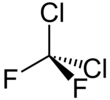Dichlorodifluoromethane
Agent Name
Dichlorodifluoromethane
Alternative Name
Refrigerant 12
CAS Number
75-71-8
Formula
C-Cl2-F2
Major Category
Solvents

Synonyms
Refrigerant 12; Algofrene type 2; Arcton 12; Arcton 6; CFC 12; Chlorofluorocarbon 12; Dichlorodifluoromethane; Diclorodifluometano [Spanish]; Difluorodichloromethane; Dwuchlorodwufluorometan [Polish]; Dymel 12; Electro-CF 12; Eskimon 12; F 12; F 12; FC 12; FCC 12; FKW 12; Fluorocarbon-12; Forane 12; Freon 12; Freon F-12; Frigen 12; Genetron 12; Halon; Halon 122; Isceon 122; Isotron 12; Isotron 2; Kaiser chemicals 12; Ledon 12; Methane, dichlorodifluoro-; Propellant 12; R 12 (refrigerant); Refrigerant 12; Refrigerant R 12; Ucon 12; Ucon 12/halocarbon 12; [ChemIDplus] UN1028; UN1078
Category
Chlorofluorocarbons
Description
Colorless gas with an ether-like odor at extremely high concentrations; Note: Shipped as a liquefied compressed gas; [NIOSH]
Sources/Uses
Has been used as a refrigerant, propellant, and blowing agent; [ACGIH] Used in photography (film cleaner); [www.ci.tucson.az.us/arthazards/medium.html]
Comments
Possible frostbite from contact with liquid; [NIOSH] Dichlorodifluoromethane is in the list of "Some volatile substances which may be abused by inhalation" published on the web site of the U.N. International Drug Control Programme, indicating its potential to cause narcosis in workers. [Reference #1] Release in confined space may result in suffocation; May cause CNS depression and cardiac arrhythmias; [ICSC]
Restricted
The manufacture of products containing CFC-12 propellants was banned by the EPA in 1978. [ACGIH]
Reference Link #1
Biomedical References
Exposure Assessment
Skin Designation (ACGIH)
Insufficient data
TLV (ACGIH)
1000 ppm
PEL (OSHA)
1000 ppm
MAK
1000 ppm
IDLH (NIOSH)
15000 ppm
Excerpts from Documentation for IDLHs
Exposure up to 60,000 ppm was tolerated for 80 minutes by 1 volunteer [NRC 1984]; when exposed at 40,000 ppm for 14 minutes and then at 20,000 ppm for 66 minutes, another volunteer developed EEG changes and had slurred speech and decreased psychologic test scores [NRC 1984].
Lethal Concentration
LC50 (guinea pigs) = 800,000ppm/30 min
Adverse Effects
Neurotoxin
Acute solvent syndrome
ACGIH Carcinogen
Not Classifiable
Other Poison
Simple Asphyxiant
Diseases, Processes, and Activities Linked to This Agent
Diseases
Occupational diseases associated with exposure to this agent:
Processes
Industrial Processes with risk of exposure: